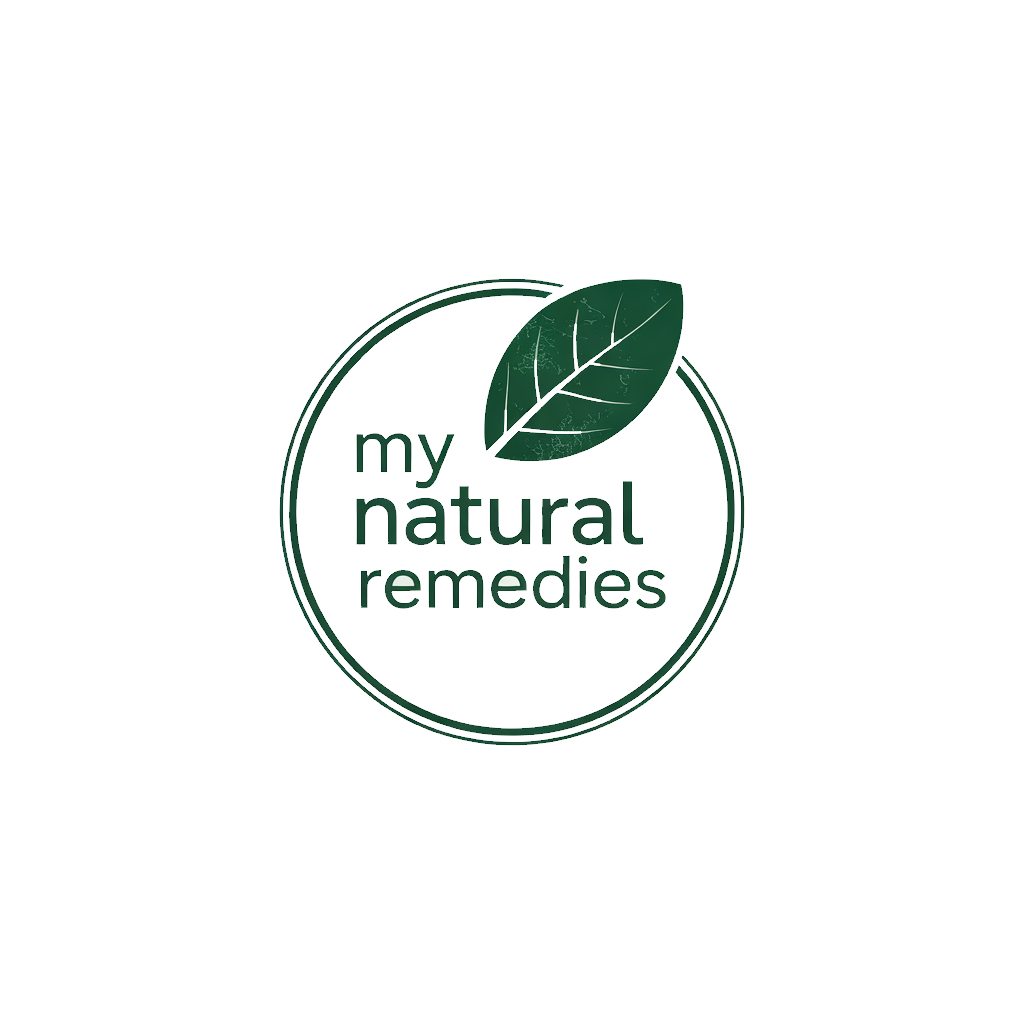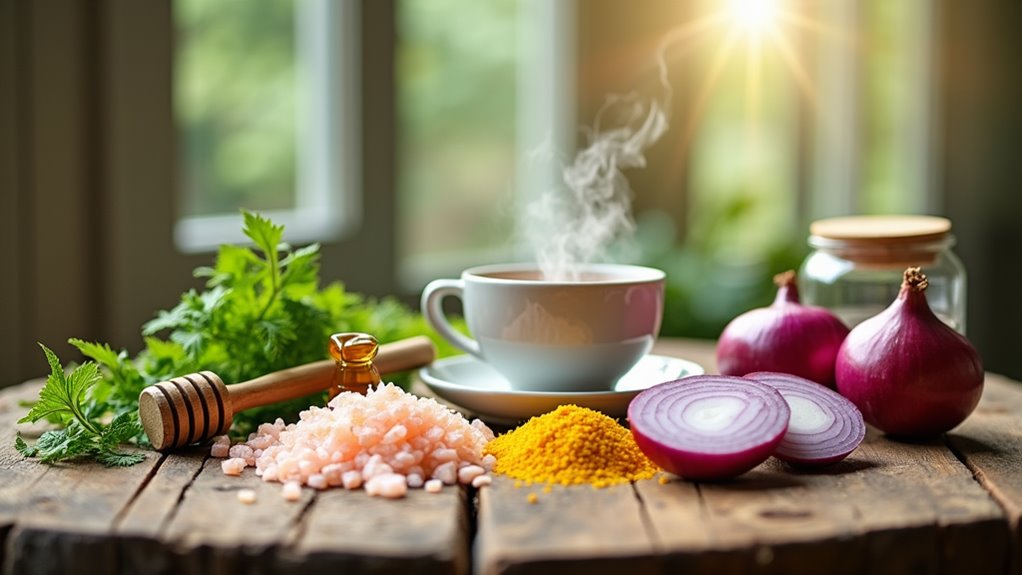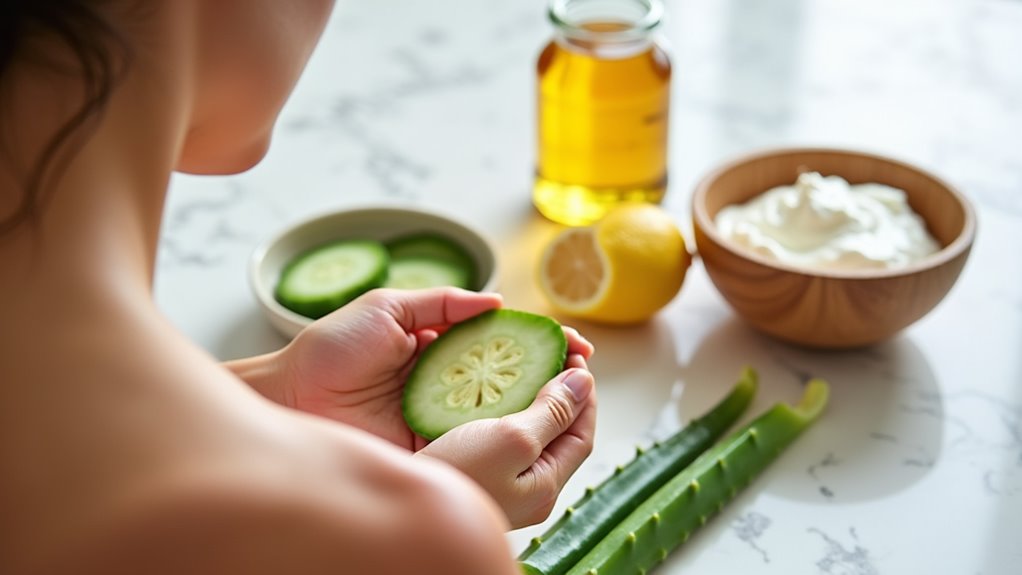Ditch the Pills! 5 Natural Allergy Remedies You Need
You can find relief from seasonal allergies without reaching for medication. Start taking local raw honey daily as a natural antihistamine, use essential oils like eucalyptus and peppermint for respiratory support, and drink herbal teas containing stinging nettle or butterbur. Add quercetin-rich foods to your diet and consider adding air-purifying plants to your home. These natural solutions work together to create a comprehensive approach to allergy management that’ll transform how you feel.
Local Raw Honey: Nature’s Antihistamine
Local raw honey serves as a natural defense against seasonal allergies by gradually exposing you to small amounts of local pollen.
When you consume honey from bees in your area, you’re essentially following the same principle as allergy shots – building immunity through controlled exposure.
To get the most benefit from this sweet allergy remedy, start taking a tablespoon of local raw honey daily about two months before allergy season begins.
You’ll want to ensure it’s truly raw and unfiltered, as processed honey loses many of its therapeutic properties.
The closer the honey is sourced to your home, the more effective it will be since it contains the specific pollens triggering your symptoms.
Join the growing community of natural health enthusiasts who’ve discovered this time-tested solution.
You can find local raw honey at farmers’ markets, health food stores, or directly from nearby beekeepers.
Remember to store it at room temperature to preserve its beneficial compounds. Additionally, combining honey with quercetin-rich foods can further enhance your body’s ability to fight off allergens.
Essential Oils for Respiratory Relief
Looking for quick respiratory relief from allergies? Essential oils offer a natural way to clear your airways and breathe easier. These concentrated plant extracts work wonders for allergy symptoms when used properly in a diffuser or with steam inhalation.
-
Picture yourself inhaling the crisp, clean scent of eucalyptus as it opens your nasal passages and soothes irritated sinuses.
-
Feel the cooling sensation of peppermint oil clearing your airways and reducing inflammation.
-
Experience lavender’s calming aroma as it helps you relax while fighting allergens.
-
Breathe in the fresh scent of tea tree oil as it naturally battles airborne irritants.
-
Let lemon oil’s bright, citrusy fragrance boost your immune system and cut through congestion.
Add 3-4 drops of your chosen oil to a diffuser, or mix with a carrier oil for topical use. Incorporating these oils into your routine can enhance overall comfort during allergy season.
You’ll join countless others who’ve discovered these powerful natural solutions for respiratory comfort.
Remember to always test oils for sensitivity first.
The Power of Herbal Teas & Supplements
Nature’s medicine cabinet offers powerful relief through herbal teas and supplements that can ease your allergy symptoms naturally. You’ll find these plant-based remedies work alongside your body’s defense mechanisms, helping reduce inflammation and boost immunity.
| Herb/Supplement | Benefits | Best Usage |
|---|---|---|
| Butterbur | Reduces nasal inflammation | Take 50-75mg twice daily |
| Stinging Nettle | Blocks histamine production | Drink 2-3 cups of tea daily |
| Quercetin | Natural antihistamine | 500mg before meals |
Start your natural allergy relief journey with these powerful botanicals that have been trusted for generations. You’ll notice butterbur works as effectively as many over-the-counter medications, while stinging nettle provides quick relief from itchy eyes and sneezing. Quercetin, found in foods like onions and apples, works even better as a supplement when paired with bromelain. Incorporating fresh fruits into your diet can further enhance your immune response. Remember to check with your healthcare provider before starting any supplement regimen, especially if you’re taking other medications.
Simple Dietary Changes to Fight Allergies
Making strategic changes to your diet can significantly reduce allergy symptoms and boost your body’s natural defenses. By incorporating anti-inflammatory foods and removing common trigger items, you’ll notice a remarkable difference in how your body responds during allergy season.
Like many fellow allergy sufferers, you can take control of your symptoms through mindful eating.
-
Load up on quercetin-rich foods like onions, apples, and berries to naturally block the release of histamines that cause sneezing and itching.
-
Add fatty fish like salmon and mackerel to your weekly menu for their omega-3s, which help reduce inflammation in your nasal passages.
-
Include local raw honey in your morning routine to build immunity against regional pollen; this honey acts as a natural vaccination by exposing your body to small amounts of local pollen.
-
Boost your vitamin C intake with citrus fruits and leafy greens to strengthen your immune system.
-
Remove common inflammatory foods like dairy, processed sugar, and wheat to reduce your overall allergic response.
Air Purifying Plants & Natural Home Solutions
Several powerful indoor plants can transform your home into a natural air purification system while reducing common allergens like dust, mold spores, and airborne particles.
You’ll want to add peace lilies, spider plants, and snake plants to your living spaces – they’re nature’s air filters and they’ll help you breathe easier. Place them strategically in bedrooms and high-traffic areas for maximum benefit.
Beyond plants, you can create an allergy-free sanctuary with simple home solutions.
Switch to natural cleaning products like vinegar and baking soda to avoid harsh chemicals that trigger reactions. Use salt lamps to attract airborne particles, and set up essential oil diffusers with eucalyptus or lavender to ease breathing. Additionally, incorporating anti-inflammatory foods in your diet can help further reduce allergy symptoms.
Don’t forget to wash your bedding weekly in hot water and vacuum with a HEPA filter regularly.
Frequently Asked Questions
How Quickly Do Natural Allergy Remedies Start Working Compared to Conventional Medications?
You’ll notice natural allergy remedies often take longer to show effects, typically days to weeks, while conventional medications like antihistamines can provide relief within 30-60 minutes after taking them.
Are Natural Allergy Remedies Safe During Pregnancy and Breastfeeding?
You’ll want to check with your healthcare provider before using any natural remedies during pregnancy or breastfeeding, as some herbs and supplements can affect your baby’s development.
Can Children Use These Natural Allergy Remedies?
You’ll want to check with your child’s pediatrician before trying natural remedies. While many are safe for kids, proper dosing and age restrictions matter for your little one’s safety.
Do Natural Remedies Work for Severe Allergic Reactions and Asthma?
You shouldn’t rely on natural remedies for severe allergies or asthma attacks. They’re not substitutes for prescribed medications. Always keep your emergency medications handy and follow your doctor’s treatment plan.
Can Natural Allergy Remedies Cause Interactions With Prescription Medications?
You’ll want to check with your doctor, as many natural remedies can interact with medications. Common ones like St. John’s Wort and ginkgo biloba might affect how your prescriptions work.





